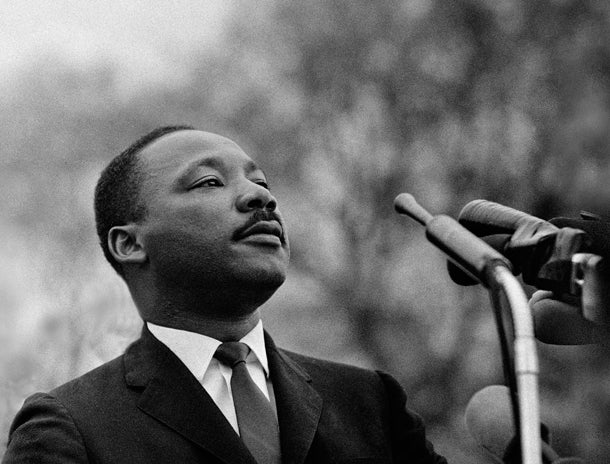
On Monday the nation will pause to observe Martin Luther King Jr. Day. Though the federal holiday is widely celebrated now—businesses and schools close, and marches and events take place—it was not always. Securing a day to honor the civil rights hero was an uphill battle that lasted decades. In fact, the fight to preserve the integrity of his day continues today.
Though Edward Brooke, a Republican Massachusetts senator at the time, brought a bill to the Senate floor with the aim of publicly acknowledging King’s birthday, it was John Conyers, then a Democratic congressman from Michigan, who introduced legislation to commemorate King’s legacy with a national holiday just four days after King’s assassination in April 1968. Conyers proposed a bill to designate Jan. 15 as Martin Luther King Jr. Day. Congress, however, was unmoved, and the bill failed. Nevertheless, Conyers persisted.
He reproposed the bill “year after year, Congress after Congress,” rallying support and co-signers as he went. Throughout the 1970s, he was able to convince a number of states to comply with the observation of MLK Day. The Congressional Black Caucus (CBC), which Conyers was a founding member of, aided his quest. The CBC brought national attention to the issue by advocating, speaking out, demonstrating and getting the public involved.
In collaboration with the Southern Christian Leadership Conference, the CBC collected millions of signatures in support of the cause. Still, when the bill (which even President Jimmy Carter endorsed) came to the floor of the House of Representatives in 1979, it was five votes short of succeeding. Black politicians, activists, organizers and leaders persisted. King’s widow, Coretta Scott King, urged Congress with speeches, rallies and campaigns. Stevie Wonder released and performed a reimagined version of “Happy Birthday” to drive the movement forward. Though the chorus was wildly popular and remains so today, the song’s verses called for action:
You know it doesn’t make much sense
There ought to be a law against
Anyone who takes offense
At a day in your celebration
’Cause we all know in our minds
That there ought to be a time
That we can set aside
To show just how much we love you
And I’m sure you would agree
It couldn’t fit more perfectly
Than to have a world party on the day you came to be
The second verse continued:
I just never understood
How a man who died for good
Could not have a day that would
Be set aside for his recognition
Because it should never be
Just because some cannot see
The dream as clear as he
That they should make it become an illusion
The hit song made public support for the holiday swell, and by 1983—the year that marked both the 15th anniversary of King’s death and the 20th anniversary of his renowned “I Have a Dream” speech at the March on Washington for Jobs and Freedom—there was a marked difference.
This time, when Conyers introduced the bill, it passed with ease, despite the attempt of then-Republican Sen. Jesse Helms of North Carolina to sabotage it. In November 1983, President Ronald Reagan signed the bill, ordaining the third Monday in January as the official U.S. national holiday known as Martin Luther King Jr. Day. King would be the third individual to be honored with a federal holiday—after Christopher Columbus and President George Washington, who, frankly, are less than worthy of the privilege—and the first “modern private citizen” to achieve the feat. The holiday was assigned to the third Monday in January, rather than his birthday of Jan. 15, in accordance with the Uniform Monday Holiday Act. Although Reagan signed the bill in 1983, and many states had already been observing the holiday, the very first national MLK Jr. Day was celebrated on Jan. 18, 1986.







Still, even then, some states resisted. Arizona revoked the holiday a year later, while other states attempted to expand the day to include historical figures who were indirectly (and violently) opposed to King’s principles and mission. It was not until the year 2000 that South Carolina acknowledged MLK Jr. Day, becoming the final state to do so. The MLK Jr. Day that we celebrate today was fought for over half a century. Yet even today, some states still connect King’s day with commemorations of Confederate soldiers and slave owners. People continue to use his day to crop his legacy by using cherry-picked quotes and snippets of his life to support their “colorblindness” and #AllLivesMatter-isms.
So today we must continue the fight our previous generations started—because it has not been won yet. King’s holiday, his legacy and his dream are under constant siege, so we must defend them at all costs.








